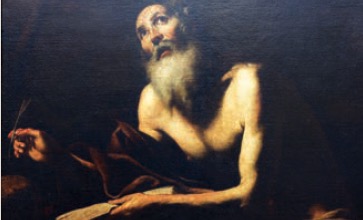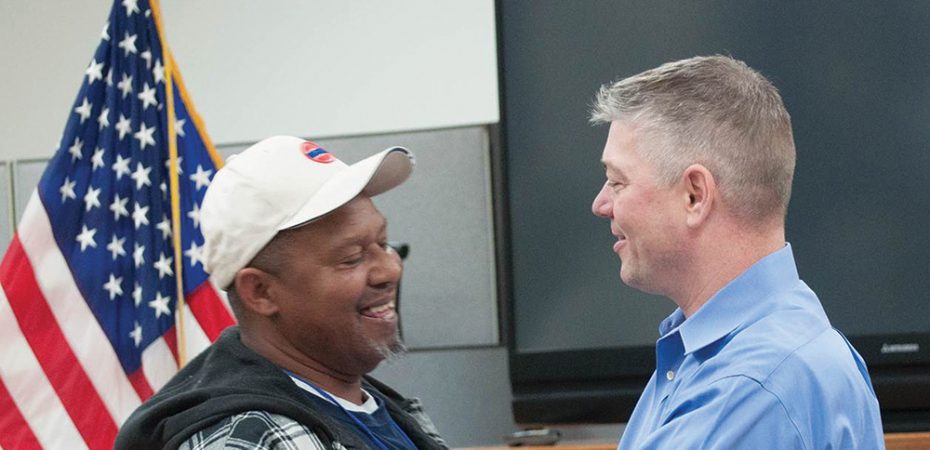Diaconal Evangelism
When deacons share the good encounters with Jesus Christ
Deacon Donald P. Richmond Comments Off on Diaconal Evangelism
Albeit not exclusively, the Acts of the Apostles identifies deacons as evangelists. Not only did they wait on tables, oversee the proper distribution of goods and wash the feet of disciples, they also moved beyond the Church into the world to share the Good News of Jesus Christ. As such, as odd as it may sound, deacons were and are evangelical Catholics.
The moniker “evangelical Catholic” has been bantered about for years. Unfortunately, however, many people have no idea what an evangelical Catholic actually is. And, sadly, most people do not appreciate the evangelical and the Catholic of “evangelical Catholic.” Both make effective evangelism possible. Not to exaggerate, it might be argued that there is no evangelization at all without evangelical Catholicism.
Historically speaking, the word “evangelical” comes from a word that means “good news.” The apostles and the early Church proclaimed the Good News about Jesus Christ. They had experienced the resurrected Christ and, as a result, they wanted to express it to all. The experience of this Good News leads to the expression of the Good News.
The “evangel” is what evangelists share as evangelical Catholics. We share the Good News. And to be clear, they did not simply share good ideas, they shared good encounters with Jesus. Having encountered the living Christ, and seeking to abide in him, deacons dare to express this encounter with others. This is Catholic evangelism!
Historical Setting
Following the trajectory of history, at one time evangelical referred to 16th-century non-Catholics — that is, evangelicals were Protestants. Although recognizing that evangelical Catholics are not Protestants — but faithful to Catholic priorities, principles and practices — they can learn from the unfortunate history of our Protestant friends.
Without going into great detail, one of the most important lessons that can be learned from these unfortunate years is that evangelical Catholics seek to speak with a prophetic voice, from the center of the Church, about the world’s need, Christ’s answer and the essential role the Church plays in articulating and offering Christ as the way, the truth and the life.
Almost every reform during the 16th and 17th centuries would broadly agree about who Jesus Christ was. Every side would say that Jesus was the way, truth and life. Catholics, however, insisted upon the “we” of Christ’s calling and not just about the “me” of this calling. As such, the various reformations were about ecclesiology (who “we” essentially are), anthropology (who “man” is before God and one another) and about how the “we” of the Church should guide and guard the “me” of individual and national identity.
The outcome, for Protestants, was an unwholesome emphasis upon the individual — a perspective that continues to lead to increased division and discord. Catholicism spoke a resounding “no” to such an approach. Rather, and importantly, Catholics would insist that “we” comes from community (the Trinity and the family), calls to community (ecclesial fellowship), commissions to community (evangelism) and destines to community (ecclesial fellowship in the Godhead for eternity). The “me” of Protestantism just won’t work.
Returning specifically to our subject, the deacon as an evangelical Catholic speaks up and speaks out, prophetically and passionately, about God’s way, truth and life as found in Jesus Christ, and how Christ’s call is from and through and toward community. In short, the evangelical Catholic deacon protests the loss of God and man while articulating and advocating the Good News of who Christ is and what Christ does both within and beyond the Church.
Awakening
About 300 years ago there was a “Great Awakening” in the United Kingdom and the United States. Apart from the movement of the Holy Spirit upon the hearts of thousands, this awakening was prompted by women and men of God who wanted, through the practice of Christian disciplines, to know God more deeply, experience him more fully, live him more faithfully and express him more effectively. These were the seeds of renewal, revival and awakening that were communicated by those who wanted the all of God for the all of the human predicament.
The Catholic Church has, for some years, been on the cusp of an ever-greater awakening. With our long, broad and deep history, we have been afforded a wealth of tools and disciplines by which we can be built up and sent out to bring in the lost. But how often do we practice those disciplines? Where, now, is the family Rosary, the daily offices, the hour of prayer, fasting, the practice of sanctuary silence and other forms of wholesome self-denial? Evangelical Catholic deacons seek to live an awakened life by practicing those disciplines that make him a better man, a better saint and, consequently, a better speaker. This, of itself, is evangelism.
Revelation of God
Evangelical Catholics, albeit differently than their evangelical Protestant friends, have a high view of holy Scripture and often a deeper appreciation about the process by which this revelation of God was received — and remains intact. To be an evangelical Catholic does not just mean that we have an interest in evangelism, in sharing the Good News of Jesus Christ.
Rather, and more so, evangelical Catholicism enjoys an approach to the sacred text that appreciates, along with the holy Eucharist, the unique character of Jesus Christ when the written word is spoken faithfully. Evangelical Catholics recognize, as the Second Vatican Council affirmed, that the Bible and the Eucharist — and they cannot be separated — uniquely communicate a dynamic presence of Jesus Christ that cannot be known elsewhere.
In keeping with St. Jerome, the evangelical Catholic knows that ignorance of Scripture is ignorance of Christ. He dares not neglect it. He does something about it. Evangelical Catholic deacons are ever mindful of their ministry of the spoken Word embedded in the Bible, embraced by the Church and empowered by the Holy Spirit.
Finally, in keeping with this, evangelical Catholicism embraces truths that are both Catholic and evangelical, not one or the other. One cannot be an evangelical without being a Catholic. Similarly, one cannot be a Catholic without being an evangelical. Understood in a certain way, Catholicism defines the breadth of evangelicalism and evangelicalism defines the depth of Catholicism. Catholicism is the vision and evangelicalism is the voice.
Catholicism is the “way” and evangelicalism is the “means.” The evangelical Catholic can be compared to the lungs, both needed, both inhaling and exhaling the breath of the Spirit, within and beyond the Church. The evangelical Catholic deacon embraces and cultivates both aspects of Christian history and heritage. As a Catholic, he is an evangelical in his daring to share Good News to a lost world.
DR. DONALD P. RICHMOND, a widely published author and illustrator, is an Oblate of St. Benedict for St. Andrew’s Abbey who worships with St. Teresa of Avila Church in Auburn, California.
……………………………………………………………………………………………………………………………………………………………..
Instruments of God’s Word

“You will not find a page in [St. Jerome’s] writings which does not show clearly that he, in common with the whole Catholic Church, firmly and consistently held that the Sacred Books — written as they were under the inspiration of the Holy Spirit — have God for their Author, and as such were delivered to the Church. Thus he asserts that the Books of the Bible were composed at the inspiration, or suggestion, or even at the dictation of the Holy Spirit; even that they were written and edited by Him. Yet he never questions but that the individual authors of these Books worked in full freedom under the Divine afflatus, each of them in accordance with his individual nature and character. Thus he is not merely content to affirm as a general principle — what indeed pertains to all the sacred writers — that they followed the Spirit of God as they wrote, in such sort that God is the principal cause of all that Scripture means and says; but he also accurately describes what pertains to each individual writer. In each case Jerome shows us how, in composition, in language, in style and mode of expression, each of them uses his own gifts and powers; hence he is able to portray and describe for us their individual character, almost their very features; this is especially so in his treatment of the Prophets and of St. Paul. This partnership of God and man in the production of a work in common Jerome illustrates by the case of a workman who uses instruments for the production of his work; for he says that whatsoever the sacred authors say ‘Is the word of God, and not their own; and what the Lord says by their mouths He says, as it were, by means of an instrument.’” — Pope Benedict XV, Spiritus Paraclitus (encyclical on St. Jerome, No. 8)
……………………………………………………………………………………………………………………………………………………………….





